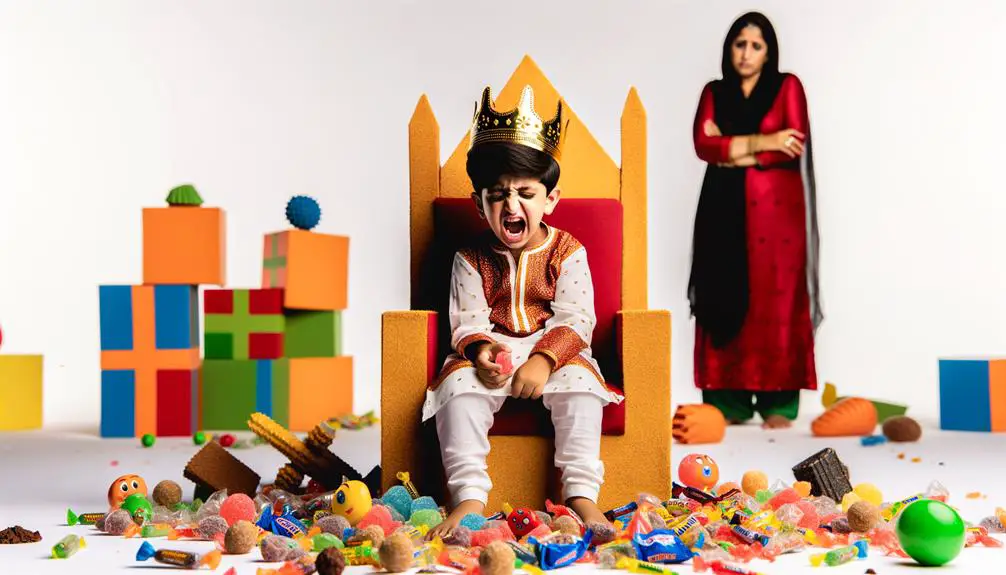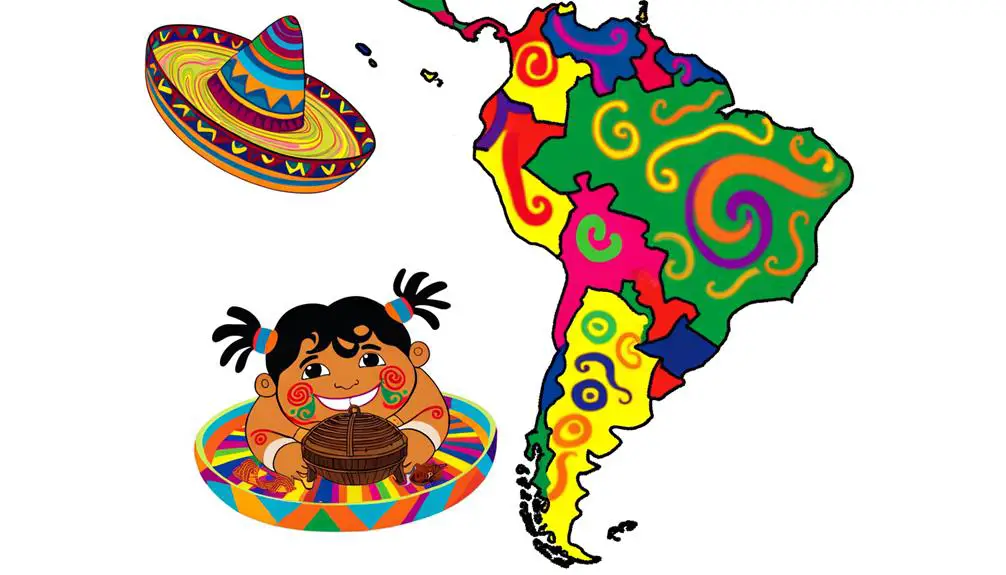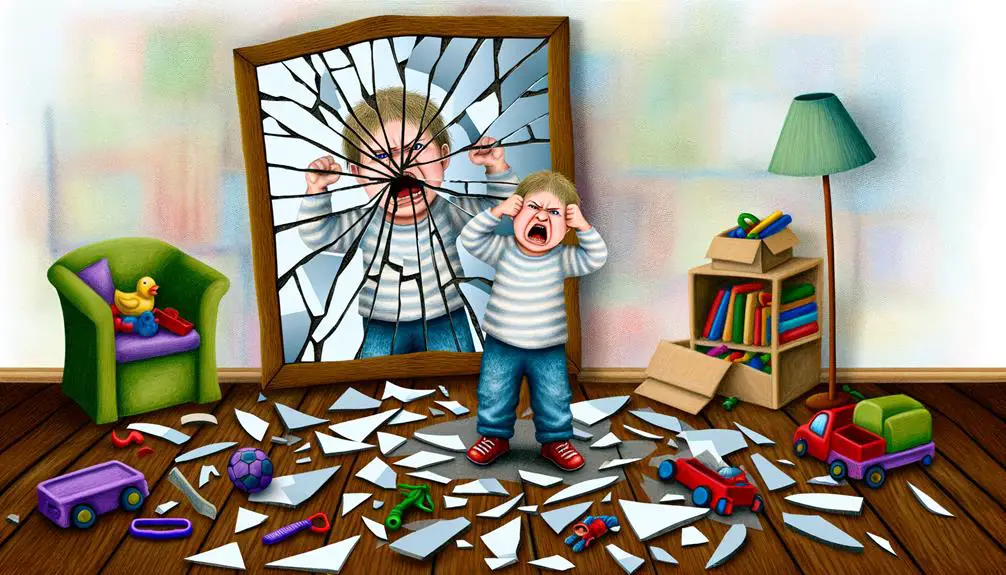You've stumbled upon terms like 'niño consentido' or 'malcriado' in Latin American cultures, which describe a child who's grown accustomed to getting their way, throwing tantrums when demands aren't met. This phenomenon stems from parents' overindulgence, creating an expectation of special treatment and a lack of empathy for others. Regional expressions vary, but they all point to a spoiled child who's grown used to getting what they want, when they want it. As you explore this concept further, you'll uncover the nuances of cultural attitudes towards parenting and the impact on child development.
Malcriado: The Ultimate Spoiled Brat

When interacting with a malcriado, you'll notice they often prioritize their desires over others' needs, throwing tantrums or pouting when they don't get their way. This behavior stems from an entitlement mindset, where they believe they deserve special treatment and exceptions. You might catch them making demands, expecting others to cater to their whims, and getting upset when their expectations aren't met.
Parental guilt often plays a significant role in shaping this behavior. Overindulgent parents, fearful of disappointing their child, give in to their demands, inadvertently creating a sense of entitlement. The malcriado grows accustomed to getting what they want when they want it and becomes accustomed to manipulating others to get their way.
As you engage with a malcriado, you'll observe a lack of empathy and understanding for others' perspectives. They may disregard boundaries, ignoring the impact of their actions on those around them.
Recognizing the root causes of this behavior is vital to addressing it effectively. By understanding the interplay between parental guilt and entitlement, you can begin to develop strategies to promote healthy relationships and personal growth.
Niño Consentido: Pampered Kid Syndrome
In Spanish-speaking cultures, you're likely to come across the term niño consentido, which describes a child who's been overindulged and spoiled, often to the point of developing an inflated sense of self-importance. This phenomenon is often a result of helicopter parenting, where parents are overly involved in their child's life, shielding them from failure and consequences. This can lead to a sense of entitlement and a lack of accountability.
As a parent, it's natural to feel guilty when your child faces difficulties or disappointments. However, giving in to parental guilt can perpetuate the niño consentido syndrome. By constantly rescuing your child from challenges, you may inadvertently create a sense of dependency and diminish their ability to cope with adversity.
It's essential to strike a balance between nurturing and letting your child develop resilience. By setting clear boundaries and allowing your child to experience setbacks, you can help them develop a healthier sense of self-worth. Recognizing the signs of niño consentido can help you avoid creating a pampered kid syndrome and instead raise a confident, self-sufficient individual.
Regional Expressions Across Latin America

Across Latin America, you'll encounter diverse regional expressions that describe a spoiled child, each reflecting the unique cultural nuances of its respective country or region. These expressions not only vary in terminology but also in connotation, tone, and cultural significance. In this rich tapestry of Latin dialects, you'll find that each region has its own distinct way of describing a child who's a bit too accustomed to getting their way.
| Region | Expression | Cultural Nuance |
|---|---|---|
| Mexico | "Niño consentido" | Emphasizes overindulgence and lack of discipline |
| Argentina | "Chamuyero" | Implies a sense of entitlement and arrogance |
| Colombia | "Niño malcriado" | Suggests a lack of boundaries and discipline |
As you explore these regional expressions, you'll begin to appreciate the subtle differences in cultural attitudes towards childhood and parenting. You'll notice that some expressions focus on the child's behavior, while others emphasize the parent's role in creating the spoiled child. By examining these regional expressions, you'll gain a deeper understanding of the complex cultural nuances that shape the way Latin Americans think about childhood and parenting.
Spoiled Rotten in Spain and Europe
As you shift your attention from the diverse regional expressions of Latin America to the European context, you'll find that the concept of a spoiled child takes on distinct meanings in Spain and other European countries.
In Spain, the notion of a spoiled child is deeply rooted in the cultural tradition of Spanish indulgence. This phenomenon is characterized by permissive parenting, where children are often given free rein to make their own decisions and choices. This approach is often seen as a way to foster independence and self-confidence in children.
In contrast, Euro parenting styles tend to emphasize discipline and boundaries, where children are encouraged to respect authority and follow rules. However, this indulgent approach can sometimes be misinterpreted as spoiling, leading to overindulgence and a lack of discipline. In some cases, this can result in children becoming overly dependent on their parents and lacking in self-reliance.
Nonetheless, the Spanish approach to parenting isn't without its benefits, as it can also lead to children who are confident, outgoing, and comfortable expressing themselves. As you explore the nuances of spoiled children in Spain and Europe, you'll discover a complex interplay of cultural values, parenting styles, and societal expectations that shape the concept of a spoiled child.
Cultural Attitudes Towards Parenting

Your cultural background and upbringing greatly influence your parenting style, with Spaniards often embracing a more permissive approach that emphasizes emotional support and open communication. This approach is deeply rooted in Spanish family dynamics, where close relationships and strong family bonds are highly valued.
| Parenting Style | Characteristics | Impact on Children |
|---|---|---|
| Permissive | Emphasis on emotional support, open communication, and lenient discipline | Children may develop strong emotional intelligence and social skills, but may also lack boundaries and self-regulation |
| Authoritarian | Strict discipline, obedience, and punishment | Children may develop discipline and responsibility, but may also struggle with self-expression and autonomy |
| Attachment-based | Focus on emotional connection, empathy, and validation | Children may develop strong emotional intelligence, empathy, and self-awareness, but may also struggle with boundaries and independence |
As you navigate the complexities of parenting, it's essential to recognize how your cultural background shapes your approach. By understanding the cultural attitudes towards parenting, you can better appreciate the nuances of Spanish parenting styles and their impact on family dynamics.
Where Permissiveness Meets Entitlement
In Spanish families, permissive parenting can sometimes inadvertently foster a sense of entitlement in children, leading to behaviors that are commonly referred to as 'niño malcriado' or spoiled child.
You may have witnessed this phenomenon in your own family or community, where well-intentioned parents inadvertently create an environment that breeds a sense of privilege in their children. This can stem from parental guilt, where parents overcompensate for their own perceived shortcomings or absences by lavishing their children with gifts and attention.
Overindulgent love, while coming from a place of kindness, can ultimately lead to an inflated sense of self-importance in children. As a result, they may develop an unrealistic expectation of entitlement, leading to tantrums and demands when their expectations aren't met.
It's essential to recognize the fine line between nurturing love and overindulgence, lest we inadvertently create a 'niño malcriado' who struggles with empathy, responsibility, and self-awareness. By acknowledging the potential pitfalls of permissive parenting, you can take steps to foster a healthier, more balanced approach to raising your children.
The Impact on Child Development

By failing to set clear boundaries, parents inadvertently shape their child's development, sowing the seeds of entitlement that can ultimately hinder their ability to form healthy relationships and adapt to life's challenges.
As you reflect on your parenting styles, consider how permissive parenting can have far-reaching consequences on your child's emotional and social development. When you consistently give in to your child's demands, you may inadvertently create an atmosphere of expectation and privilege. This can lead to social consequences, such as difficulty sharing, taking turns, and empathizing with others.
Moreover, your child may struggle with self-regulation, as they're not taught to manage their emotions and behaviors within reasonable limits. As a result, they may become easily frustrated, angry, or disappointed when their expectations aren't met.
Common Traits of Spoiled Children
As you explore the characteristics of spoiled children, you'll notice some common traits. Five common characteristics of spoiled children include an exaggerated sense of entitlement, an inability to handle disappointment, and a tendency to blame others for their mistakes. These traits are often rooted in overindulgent habits, which can lead to an entitlement mentality.
| Trait | Description | Example |
|---|---|---|
| Exaggerated sense of entitlement | Believing they deserve special treatment | Expecting the latest gadgets without doing chores |
| Inability to handle disappointment | Becoming upset when they don't get their way | Throwing a tantrum when denied a toy |
| Blaming others for mistakes | Shifting responsibility to avoid consequences | Saying "it's not my fault" when caught misbehaving |
These traits can be challenging to address, but recognizing them is the first step towards change. As you understand these characteristics, you'll be better equipped to identify and address overindulgent habits that contribute to an entitlement mentality in spoiled children.
Breaking the Cycle of Overindulgence

You must recognize the triggers and consequences of overindulgence to break the cycle of spoiled behavior in children. Parental guilt often drives overindulgence, as you may feel the need to compensate for past mistakes or make up for lost time. However, this only reinforces negative behavior patterns. To break the cycle, you need to identify the triggers that lead to overindulgence, such as feelings of guilt or anxiety. Once you're aware of these triggers, you can develop strategies to manage them in a healthier way.
Establishing vital boundaries is essential in breaking the cycle of overindulgence. Set clear expectations and consequences for your child's behavior, and consistently enforce them. This helps your child develop a sense of responsibility and self-regulation. By setting healthy boundaries, you're teaching your child that their actions have consequences, and that they need to take responsibility for their own behavior.
Frequently Asked Questions
Can a Spoiled Child Become a Responsible Adult?
You're wondering if a spoiled child can become a responsible adult. The answer lies in personal growth and emotional maturity.
As you progress into adulthood, you'll face challenges that test your ability to adapt and take responsibility. If you're willing to confront your flaws and work on self-awareness, you can develop emotional intelligence and become a more accountable individual.
It's a journey of self-reflection, but with effort, you can break free from the patterns of entitlement and become a responsible, independent adult.
Are Only Rich Kids Prone to Being Spoiled?
You might think that only rich kids are prone to being spoiled, but that's an oversimplification. Socioeconomic factors, such as access to resources and opportunities, can contribute to a sense of entitlement.
However, cultural norms also play a significant role. In some cultures, indulging children is seen as a sign of love and care, while in others, it's viewed as a recipe for disaster.
You'll find spoiled kids across all socioeconomic backgrounds, and it's essential to look beyond wealth to understand the root causes.
Can Parents Spoil Their Kids Unintentionally?
As you navigate the complex web of parenting, you might unintentionally spoil your kids without even realizing it. It's like the ancient Greek myth of Pandora's box – once you open the door to overindulgence, it's hard to shut it again.
Overindulgent grandparents, societal pressures, and our own desire to see our kids happy can create a perfect storm of spoiling. By being aware of these factors, you can take a step back and reassess your approach to parenting, ensuring your child grows into a well-rounded individual.
Is Being Spoiled a Genetic Trait?
You're wondering if being spoiled is a genetic trait. The answer lies in the nurture debate. While some argue that genetic predisposition plays a role, others believe it's largely shaped by environment.
You might inherit certain personality traits, but it's how you're raised that ultimately determines whether you become spoiled. So, is it nature or nurture? The truth likely lies in a combination of both.
Can a Spoiled Child Be Fixed With Strict Discipline?
You're wondering if a spoiled child can be 'fixed' with strict discipline. While it's tempting to think that Tough Love will whip them into shape, the answer is more intricate. Setting clear boundaries and consistently enforcing them is key, but it's also vital to understand the underlying reasons for their behavior.
You'll need to strike a balance between empathy and discipline, providing guidance while avoiding overindulgence. It's a delicate dance, but with patience and consistency, you can help them develop self-regulation skills and a stronger sense of responsibility.







